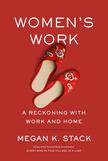Review: The post-baby battleground
Before having children, Megan K. Stack worked as a war correspondent for The Los Angeles Times, a career that proves to be useful preparation for navigating the post-baby battleground. Her husband’s own journalistic work lands her family in China and India, where household help is cheap, and Stack quits her job to work on a book and manage the household.
But even with a nanny and housekeeper in place, Stack struggles to carve out time for her career. Hiring help means her home becomes both a “job site” and a kind of war zone, as the women of the house navigate misunderstandings and cultural differences, as well as violence, injuries and hurts that change the course of lives and friendships.
In Women’s Work: A Reckoning With Work and Home, Stack offers a brutally honest look at her own efforts to navigate the strange dance between her and her employees, who must perform the functions of a family without truly being part of it. Through vivid prose and tight narratives, she actively and effectively dispels the notion that stereotypical “women’s work” should be categorized as a “soft” subject.
Through vivid prose and tight narratives, Megan K. Stack actively and effectively dispels the notion that stereotypical “women’s work” should be categorized as a “soft” subject.
Women’s Work illuminates the shared obstacles that face both mothers who hope to thrive at work and at home and those who are simply trying to survive. But Stack does not shy away from describing how the stakes differ for each. Hiring household help meant that Stack’s sons gained loving caretakers and an international upbringing. But the children of Xiao Li, Mary and Pooja, the women who serve Stack’s household, “got money but grew up without their mothers,” Stack writes.
Stack’s Catholic upbringing influences her understanding of justice, guilt and rituals throughout, and her journalistic background pushes her to ask more and more questions of Xiao Li, Mary and Pooja. The third section of the book focuses on their stories, and the resulting narrative honors the complexity of their experience as women, workers and mothers. But while all three consent to be written about, only Pooja seems to embrace it.
Stack is self-aware and recognizes the fact that even being able to ask questions about work-life balance makes her a part of a privileged class. She concludes with a call for men to do more at home. It is a necessary one. But this tidy answer cannot fully address the central tension of Stack’s narrative, which has no easy solution. The ability to find balance in the midst of her own struggles relies entirely on the work of women who are struggling even more.
This article also appeared in print, under the headline “The post-baby battleground,” in the September 16, 2019, issue.









